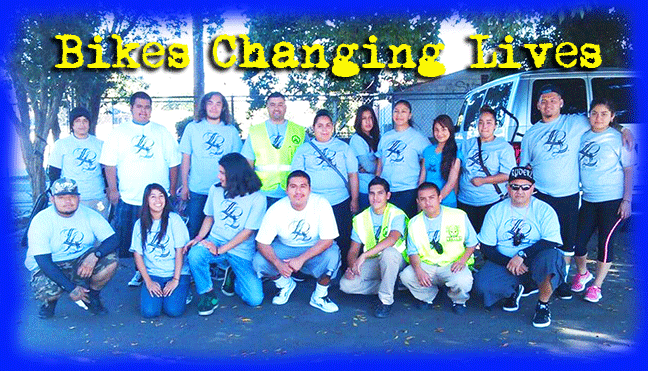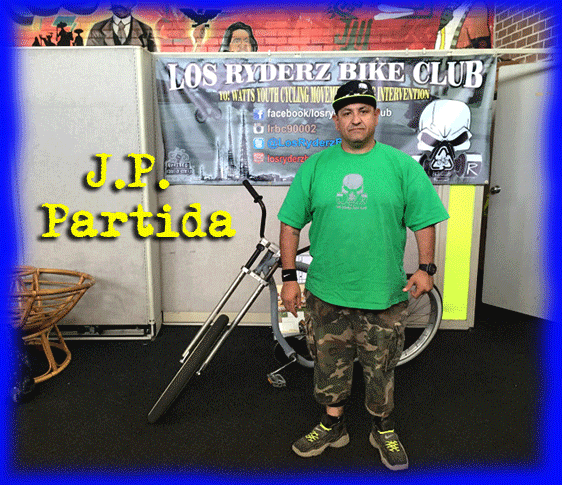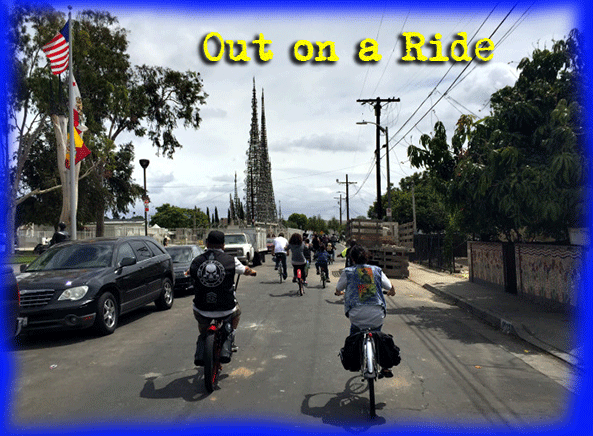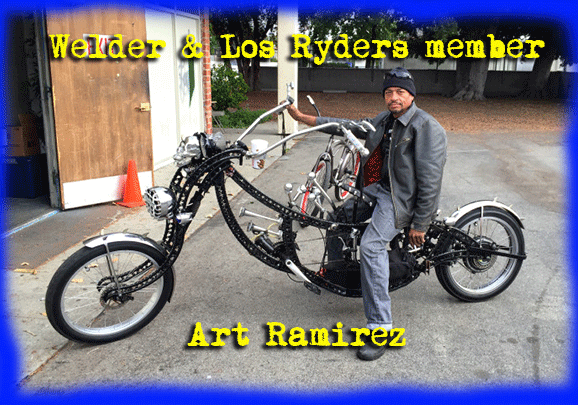EDITOR’S NOTE: Programs that are effective at helping gang-involved kids and others to reroute the trajectories of their lives, come in a variety of packages—as illustrated by a program known as Los Ryderz Bike Club, profiled by reporter Sarah Zahedi in the story below. Yet all such programs have certain elements in common—namely, a caring and accepting community, a safe place to hang out, and some activity to engage in that builds skill, knowledge, discipline, and self worth. Los Ryderz has all that and more.
Riding His Way Out of Gang Life
How a Young Watts Gang Member Found a Different Kind of “Family” Through an Unusual Community Bike Club
by Sarah Zahedi
Riding his bike through the barren projects of Watts — the sidewalks of which are scattered with used heroin needles and double-sided razor blades — 21-year-old William Fabian is enjoying himself. He is exploring his neighborhood with friends from Los Ryderz, a biking club for youth who are struggling to escape gang activity.
Today, Fabian (pictured front and center in the photo above) feels free to ride across gang-territory lines into new neighborhoods he hadn’t seen before, but just a short time ago he would not have dared.
Three years ago, Fabian walked the halls of Alain Leroy Locke High School in Watts, proud of his reputation as a gang member.
“The gang gave me attention — I had their back and they had mine,” Fabian said. “It made me feel good inside to have people look at me like I was something.”
No one had ever told Fabian he would amount to anything. Although he had felt support from his mother throughout his life, his relationship with his father has always been rocky.
“My mom has always been there for me, my dad — not as much I could say,” Fabian said. “The stress of my family problems got to me and fighting and causing trouble was my way of relieving myself of that.”
Fabian got heavily involved in gang-related fights when he started going to Santee Education Complex in south Los Angeles. Then, in 2010, he moved to Watts and began attending Locke. There, he stayed involved in gang activity.
“I was already known in Locke to people for my reputation at Santee,” Fabian said. “I hung out with people I met who looked up to me.”
The youngest of four siblings and the only first-generation American in his family, Fabian was introduced to gang activity and culture at an early age. Fabian’s two eldest brothers, who emigrated from Mexico and attended Belmont High School, were regularly involved in gang-related fighting in school. When he began school in Watts, William Fabian followed his brothers’ example.
“I didn’t dedicate myself to my schoolwork but I dedicated myself to fighting and being a troublemaker,” Fabian said.
Not succeeding in class and continually getting cited for fighting at school, Fabian was finally kicked out of Locke in 2012.
It was then that he knew he had to make a change. Walking along 103rd street a few blocks from his house in Watts, Fabian happened upon the Yo! Watts Youth Center. At the time it housed the Inspire Research Academy, a nonprofit that allows young adults 18 to 25 to earn their high school diploma in small classes at the center.
In 2012, he began classes at the center. In the same room where his classes were held was the Los Ryderz bike club headquarters. There, Fabian met Los Ryderz founder Javier “JP” Partida.
THE BIRTH OF LOS RYDERZ
Partida, who worked as a football coach from 1999-2007 at various local high schools, founded Los Ryderz in May 2012 to give endangered youth the opportunity to go on weekly bike rides all over Los Angeles. He paid for many of the bikes himself; others were donated. About 50 bikes are stored at the Los Ryderz headquarters. He teaches club members how to fix and maintain the bikes and provides them for members to use during rides for free.
When Partida first met Fabian, he encouraged him to join the club. He noticed Fabian’s hesitance, partly fueled by the fear of being shot off his bike if rival gang members saw him in their neighborhood and partly by his uncertainty about what being a part of the club would be like.
“He still had the gang mentality when I first met him,” Partida said. “It took me a while to convince him that it was worth his time.”
“I didn’t get the point, it didn’t catch my attention,” Fabian said. “But little by little, JP would just encourage me to come out and experience what it’s like to be a part of the club and finally I was convinced.”
For Fabian, the first ride made all the difference. Los Ryderz biked from the Yo Watts! Center to Ted Watkins Memorial Park and proceeded onto a 6-mile ride through the neighborhood.
“I felt good,” Fabian smiled. “We were just a group of people rolling down the street on bikes and cars were honking at us in support, people were cheering for us, yelling ‘Hey man, keep on riding!’ I just kept coming back.”
Fabian said he was particularly thrilled to go to areas of his community he had not previously felt comfortable about going to before.
“It’s amazing … I’m always seeing people from different neighborhoods on my rides … people that — I’m not even going to lie — people that I didn’t get along with,” Fabian said. “Now they see me riding, doing something positive. They don’t mess with me no more.”
Since that first ride, Fabian has dedicated himself to bike riding.
“I go every night at least for one 2- to 3-mile ride to myself and that’s it,” Fabian said. “It feels great just to cruise a little bit and not worry about anything else.”
DARKNESS AND LIGHT
Although he said his peers and friends made fun of him when he first joined the bike club, he only gets support from them today, especially now that he has a leadership role in the club as sergeant at arms, or youth leader of the club.
“They would laugh at me, make jokes that I was wasting my time but people didn’t know how useful it is,” Fabian said. “Now they see me, with my vest and my leadership position and know I’m doing something good … they’re proud of me.”
Gang-interventionist groups like Los Ryderz, which incorporate exercise into their programs, are some of the most effective in reducing gang activity, according to UCLA School of Public Affairs faculty member Michelle Talley. This is because such groups work both mentally and physically.
“It’s so powerful on so many levels. It’s an alternative to gang involvement that builds both physical and emotional strength,” Talley said. “It’s a way to cope, to build self-esteem and self-confidence.”
Because all age groups can enjoy bike riding, it is a model example of a constructive gang-interventionist activity in the long term, she said. Talley is a licensed clinical social worker whose main focus is working with youth and families as it relates to public child welfare, including youth dealing with criminal issues.
“What is an appropriate activity for a 10-year-old is different from what’s appropriate for a 15-year-old and a 19-year-old because they are going through various developmental stages,” Talley said. “Activities like biking can be appropriate at all these stages.”
For this reason, surrounding law enforcement has taken notice of Los Ryderz and its success. Officer Ron Harrell serves as the senior lead officer in the Los Angeles Police Department’s community safety partnership program for the Imperial Courts housing project in Watts. After seeing Los Ryderz’ bike rides through Watts and visiting club headquarters to see how Partida worked with endangered youth, Harrell said he was immediately impressed.
“Today, a lot of kids don’t do physical activities like kids did in the past,” Harrell said. “They feel good because they are seeing improvements in their stamina, they are actually physically doing something and getting to know their community while they do it.”
In a neighborhood where gangs are prevalent throughout nearly every square inch, Harrell said community organizations like Los Ryderz help create a different image of Watts within the community.
“These kids are being seen and they’re doing something positive instead of something negative and a lot of people see Watts in a negative way,” Harrell said. “Where there is light though, there can be no darkness.”
This positive image of Watts is in line with a recent drop in crime in the area. According to the LAPD, since 2010 violent crime is down by 57 percent in Imperial Courts, 54 percent in the Jordan Downs project in Watts and 38 percent in the Nickerson Gardens project in Watts. Harrell said community organizations, which aim to prevent gang activity, have contributed to dropping crime rates.
“Community organizations are taking back the community,” Harrell said. “So many kids are just trying to find something different and get out of a gang. If they find an activity they enjoy, they keep coming back.”
While he still lives within gang territory, Fabian no longer feels compelled by his peers to take part in gang activity. Talley noted that many times, gang members will be allowed to leave their gangs if they show skill and potential for success in another area like bike riding.
“A lot of the times youth can get permission from a gang to not be a part of it anymore because they’re going to be somebody, if they show they are really good at something,” Talley said.
When youth become aware that they can excel outside a gang, Talley said the youth are able to see themselves in a new, positive light.
“These kids are not just gang members. Being a part of a gang is just one aspect of how these kids define themselves,” Talley said. “If we define them as just gang members, that’s the message they get and it’s harder for them to make a change.”
THE POWER OF RELATIONSHIPS
In Fabian’s case, Partida played a significant role in helping him to see himself as more than just a gang member and a troublemaker.
“I’ll always remember when he told me that I was something,” Fabian said. “He would say, ‘You’ll always be something in life, even if you think you are not.’ No one had ever told me that.”
A positive, strong relationship between a gang-interventionist and a youth at risk of getting into trouble, like that between Fabian and Partida, is vital for a program’s success, in Talley’s experience.
“Youth are more likely to be active in programs where they have a strong relationship with the interventionist, when they know the interventionist is always there for them.”
And through the past three years he has been with Los Ryderz, Fabian has come to help or go on rides from the club headquarters almost six days a week. He said he has grown close to Partida and looks to him as a mentor.
“If it wasn’t for JP, I probably would have never joined a club like Los Ryderz,” Fabian said. “I gained JP’s trust and respect with my involvement and he’s gained mine by always being there for me. He’s taught me so much about life and how to live positively. He’s my mentor … one of my role models.”
Growing up in South Central Los Angeles and being involved with gangs himself as a youth, Partida knows the negative impact of gang activity on an adolescent’s lifestyle firsthand. Having lost friends to gang-related violence, Partida said he is thrilled to see youth such as Fabian evolve and turn their lives around through Los Ryderz.
“I wanted to make a difference,” Partida said. “This club doesn’t charge a penny. The only thing we ask for is loyalty and commitment from the members and in return the kids come out with skills they didn’t have before and something positive to do with their time.”
Because of Los Ryderz, Fabian said he has been able to become a more open and happy person.
“I changed a lot,” he said. “Right now, you see me … I like to laugh, to talk, to smile. Back then I wasn’t like that. I used to be serious all the time. I wouldn’t talk to anybody except my friends.”
Knowing how much the club helped him change his life, he said he now wants to encourage other youth to do the same.
“I talk to other kids. They know I’m a good friend so they tell me their problems at home or at school,” Fabian said. “I advise them to go to the bike club so they can have a place to relieve their stress with biking, a place where they can enjoy themselves.”
The bike club has even become like a family to him.
“No one messes with you, everyone is cool and nice to each other,” Fabian said. “All we care about is riding and having a good time.”
Just having completed an internship to be a custodian at John Ritter Elementary School, he hopes to go to culinary school one day or study sociology.
“I like working with people and am starting to think of college for the first time in my life,” Fabian said. “Los Ryderz really helped me to get to this point. It’s magical.”
This story first appeared in Youth Today.
All photos (except the very first one) by Sarah Zahedi




